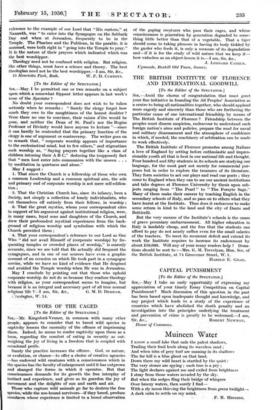[To the Editor of the SPECTATOR.]
SIR,—May. I be permitted one or two remarks on a subject upon. which a somewhat flippant letter appears in last week's issue of the Spectator ?.
No doubt your correspondent does not wish to be taken seriously when he remarks : " Surely the clergy forget how much they owe to the naughtiness of the honest doubter ? Were -there no one to convince, their raison d'être would be gone, and neither the. Dean of St. Paul's nor the Regius Professor of Divinity would have anyone to lecture "—since it can hardly be contended that the primary function of the clergy is one of argument or controversy. The writer goes on to remark that, " corporate worship appears of importance to the ecclesiastical mind, but to few others," and stigmatizes such worship as, " Saying prayers together like a class of children intoning their A B C," deducing the (supposed) fact that " men best enter into communion with the unseen . . . by meditation in quietness and alone."
-May -I suggest : 1. That since the Church is a fellowship of those who own a common Leadership and a common spiritual aim, the sole and primary end of corporate worship is not mere self-edifica- tion ; 2. That the Christian Church has, since its infancy, been a Society, not simply a collection of lonely individualists, who cut themselves off entirely from their fellows, in worship ; - S. That the great mystics, whom your correspondent cites in support of his argument against institutional religion, were, in many cases, loyal sons and daughters of the Church, and drew their profoundest mystical experiences from the back- ground of religious worship and symbolism with which the Church. provided them ; 4 That your correspondent's reference to our Lord as One Who " did not avail Himself of (corporate worship) by fre- quenting temples or crowded places of worship," is scarcely accurate, since we are told that He actually did frequent the synagogues, and in one of our sources have even a graphic account of an occasion on which He took part in a synagogue service, while we have no kind of evidence that He despised and avoided the Temple worship when He was in Jerusalem.
May I conclude by pointing out that those who uphold corporate worship do not do so because they confuse theology with religion, as your correspondent seems to imagine, but because it is an integral and necessary part of all true normal•
religious life ?—I am, Sir, &c., G. M. D. DERHAM. Zensington, W. 14.










































 Previous page
Previous page